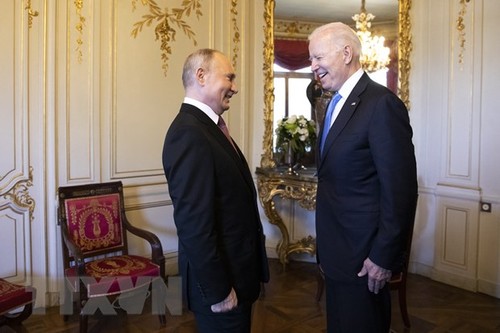 US President Joe Biden (right) met his Russian counterpart Vladimir Putin in Geneva, Switzerland, June 16, 2021. Photo: AFP/VNA US President Joe Biden (right) met his Russian counterpart Vladimir Putin in Geneva, Switzerland, June 16, 2021. Photo: AFP/VNA
|
This was not the first time Biden has met Putin, but it was the first summit between the two leaders since Biden took office in January. During the four-hour Geneva meeting, though they remained at odds, both men frankly discussed and sought opportunities for cooperation where the two countries have shared interests.
Many differences
At the summit, Washington expressed concern over Moscow's arrest of opposition leader Alexei Navalny and the increased presence of Russian troops on Ukraine's eastern border. Washington accused Russia of being behind cyber attacks in the US.
President Biden sharpened the tone when he said Russia will suffer "devastating”consequences if Navalny is killed in prison or if the cyber attacks on the US continue. President Putin dismissed Washington's concerns about the arrest of Navalny. He explained that Russia's increased military presence near Ukraine is simply because Russia is conducting exercises on its own territory. Regarding Ukraine's intention to join NATO, which Russia has strongly opposed, Putin said there is nothing to discuss here.
Neither invited the other to come visit.
Opportunities to build stable relations
Despite differences, the Biden-Putin summit sent positive signals. The two leaders reached consensus on three important issues. First, they agreed to move toward strategic stability and inter-sectoral consultations, chaired by the two foreign ministries, on the implementation of the Strategic Arms Reduction Treaty (START-3). The summit’s joint statement said Washington and Moscow will soon launch a comprehensive dialogue on strategic stability, laying a foundation for future arms control and risk reduction. Second, the two agreed to send their recalled ambassadors back to their embassies to restart consultations between the two foreign ministries. Third, Russia and the US agreed to hold specific consultations on cybersecurity.
Both leaders made positive statements following their meeting. President Biden said the coming months will be a testing time for improving relations. President Putin called the summit a fairly open and frank dialogue in which they did not seek to pressure each other.
Both leaders’ willingness to listen to each other's views seems a good starting point, which could lead to further dialogues on more specific solutions to improve relations between the two super powers.